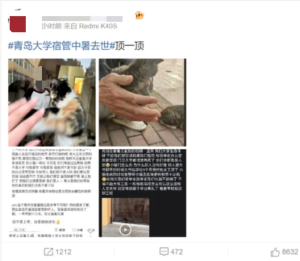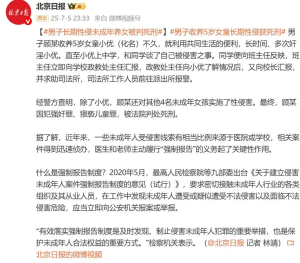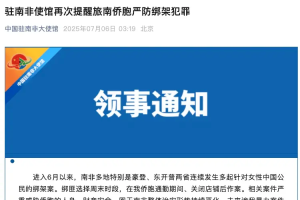95-year-old retired cadre was identified as the main criminal of evil forces and was tried in bed. Lawyer: Whether to be imprisoned depends on factors such as harmfulness and physical condition

According to the Beijing News, 95-year-old Zheng Wei is waiting for his second trial. Zheng Wei is currently staying at home because he was released on bail by the court. He suffers from diabetes and sometimes has to go to the hospital for inpatient treatment. His physical condition is relatively stable, but he is not very mobile and needs to be supported or sit in a wheelchair when going out.
Due to physical reasons, Zheng Wei was lying on the hospital bed during the first trial and participated in the trial via video link.
On November 22, 2024, the People’s Court of Lufeng City, Guangdong Province, opened a trial of a case of extortion. The defendant Zheng Wei was lying on the hospital bed due to physical reasons and participated in the trial via video link.
The prosecutor accused that in 2004, Zheng Wei gathered 12 villagers from his hometown to form a criminal gang of evil forces, using violence, threats, coercion, intimidation and other means to commit crimes such as extortion, intentional destruction of property, intentional injury, etc., doing evil, oppressing the people, seriously disrupting social order, and causing a relatively bad social impact. Zheng Wei believed that he was innocent and submitted more than 20 pieces of evidence through his lawyer.
12 days later, the court made a first-instance judgment. The court determined that Zheng Wei, in order to seek personal gain, organized his co-defendant Zheng Mei to often gather multiple co-defendants to form a gang of evil forces. Zheng Wei played a major role in the gang of evil forces and was the principal offender. He should be held responsible for the whole case according to law. Zheng Wei was found to have committed the crime of extortion, participated in the illegal act of intentionally destroying other people’s property, and participated in the illegal act of intentionally injuring others. The defendant Zheng Wei was convicted of extortion and sentenced to five years in prison and a fine of 50,000 yuan. Zheng Wei appealed against the verdict.
Chen Pingfan, a legal expert of the National “Double Thousand Plan” and director of Furong Law Firm, said that according to the description of the case, Zheng Wei was unable to appear in court in person due to his physical condition (diabetes, mobility difficulties and needing to sit in a wheelchair), and the court allowed him to participate in the trial via video link. This practice is in line with the provisions of the Criminal Procedure Law. Defendants who are unable to appear in court due to health reasons can participate in the litigation through video and other means.
In this case, the court made flexible arrangements based on Zheng Wei’s physical condition, which not only protected his litigation rights but also ensured the legality of the trial procedure. In addition to health reasons, other legitimate reasons recognized by the law for not appearing in court include: force majeure: such as natural disasters and public health emergencies (such as restrictions on the movement of people during the epidemic). Conflict of major affairs: such as affairs involving life safety or public interests, but requiring court review and approval.
If the 95-year-old defendant Zheng Wei is upheld in the second instance, will he be imprisoned? Chen Pingfan believes that it needs to be judged based on the specific circumstances. According to Article 265 of the Criminal Procedure Law, if the defendant meets the following conditions, he may be temporarily released from prison: (1) suffering from a serious illness and requiring medical treatment outside prison; (2) unable to take care of himself; (3) pregnant or breastfeeding women. In this case, Zheng Wei is 95 years old and has difficulty moving. She may meet the conditions of “unable to take care of herself” or “serious illness”. The court can decide to release her from prison according to law. However, there are exceptions: if the behavior is extremely harmful to society (such as violent crimes and recidivism), even at an advanced age, the person may be imprisoned.
Whether he is actually imprisoned depends on the following comprehensive assessments:
Physical health status: A medical institution needs to issue a certificate to confirm whether he has the ability to serve his sentence.
Social danger: If the court believes that he is unlikely to reoffend and will not harm society, he is more likely to serve his sentence outside prison.
Legal provisions and policies: In China’s judicial practice, there is a tendency to “combine leniency and severity” with elderly criminals, especially in cases of non-violent crimes and no social danger.
Family cooperation: Family members or the community need to provide supervision conditions for serving his sentence outside prison, otherwise he may still be imprisoned. The particularity of this case: Zheng Wei was a retired cadre and may receive a stricter health review, but the seriousness of the criminal sentence will not change due to his identity.
Related reports:
95-year-old retired cadre sentenced to 5 years in prison and identified as the “primary member” of a gang of evil forces
Zheng Weijun believes that the reason why the sentence is inconsistent is that the court did not recognize that his father was also a member of the gang. Zheng Weijun explained that the reason why he got into trouble was mainly because his father used his status as a retired cadre to continuously report the problem of villagers being arrested. “In the past few years, he has written dozens of materials to relevant departments.”
95-year-old Zheng Wei is waiting for his second trial.
Because he was released on bail by the court, Zheng Wei is currently staying at home. He suffers from diabetes and sometimes has to go to the hospital for inpatient treatment. His physical condition is relatively stable, but he is not very mobile and needs to be supported or sit in a wheelchair when going out.
On November 22, 2024, the People’s Court of Lufeng City, Guangdong Province, opened a trial of a case of extortion. The defendant Zheng Wei, due to physical reasons, was lying on a hospital bed and participated in the trial via video link.
The prosecutor accused that in 2004, Zheng Wei gathered 12 villagers from his hometown to form a criminal gang of evil forces, using violence, threats, coercion, intimidation and other means to commit crimes such as extortion, intentional destruction of property, intentional injury, etc., doing evil, oppressing the people, seriously disrupting social order, and causing a relatively bad social impact.
Zheng Wei believed that he was innocent and submitted more than 20 pieces of evidence through his lawyer.
12 days later, the court made a first-instance judgment. The court determined that Zheng Wei, in order to seek personal gain, organized his co-defendant Zheng Mei to often gather multiple co-defendants to form a gang of evil forces. Zheng Wei played a major role in the gang of evil forces and was the principal offender. He should be held responsible for the whole case according to law. Zheng Wei was found to have committed the crime of extortion, participated in the illegal act of intentionally destroying other people’s property, and participated in the illegal act of intentionally injuring others. The defendant Zheng Wei was convicted of extortion and sentenced to five years in prison and a fine of 50,000 yuan.
Zheng Wei was dissatisfied with the verdict and appealed.
The Beijing News reporter learned that Zheng Wei joined the Dongjiang Column of the Chinese People’s Liberation Army in June 1949 and participated in the War of Liberation. After the founding of New China, he worked in Lufeng County Public Security Bureau, Yingde Tea Farm and Shaoguan Prison, and retired in 1991.
Determination of extortion
Zheng Wei’s son Zheng Weijun told the Beijing News reporter that his father left his hometown, Chaiqiaotou Village, Nantang Town, Lufeng City, after joining the revolution in 1949. He has been working outside for more than 50 years and rarely returned to the village. In 2004, because his grandmother was seriously ill, his 74-year-old father decided to return to his hometown to stay temporarily and serve his grandmother. “After my grandmother passed away the following year, my father left Chaiqiaotou Village and lived in the village for more than a year.”
It was also in that year that the villagers of Chaiqiaotou Village voted in the ancestral hall and elected 12 village representatives to temporarily manage village affairs.
Zheng Wei went out to work very early and was not a villager in the village. He was not elected as a village representative. Later, the 12 village representatives nominated villager Zheng Mei as the leader.
As for why the “12 representatives” were established, some villagers believed that it was proposed and elected by Zheng Wei at the time, and they followed Zheng Wei’s arrangements, but Zheng Wei himself believed that this statement was not accurate.
According to Zheng Wei’s own recollection, when he was temporarily staying in the village in 2004, the village was rebuilding a water supply project. The village cadres who were previously responsible for the affairs of Chaiqiaotou Village had gone out to work, and Chaiqiaotou Village was in a state of no village cadres to manage the village affairs. Therefore, some villagers proposed to elect several village representatives to manage village affairs. “Some villagers built illegally in the village. If they are not demolished and cleaned up, the water pipes cannot be laid in the village at all.”
The three illegal and criminal facts that the Lufeng Court determined that Zheng Wei participated in occurred in the period shortly after the establishment of the “Twelve Representatives”.
The first-instance judgment records that the Lufeng Court believed that the first illegal and criminal act that Zheng Wei participated in was to collect land compensation from villagers. From June 13 to 30, 2004, Zheng Wei organized the “Twelve Representatives” to make illegal profits. Under the pretext that villagers illegally occupied land to build houses, he used threats and coercion to forcibly demand land compensation from more than 20 households at a price ranging from 5,000 yuan to 6,000 yuan per homestead, and received a total of RMB 98,500.
According to a villager representative, after the election of the “12 representatives”, a notice was posted in the village soon, entitled “Partial Decision on Establishing Village Rules and Regulations in Chaiqiaotou Village”, which mentioned the establishment of a fruit and forest contracting and contracting system to tidy up the village appearance. The notice also mentioned the need to clean up the problem of illegal occupation and construction, and collect land compensation from villagers who illegally occupied the village’s collective land to build houses.
After that, except for one household that did not pay the land compensation, the other 21 households paid the land compensation in accordance with the notice.
One of the “12 representatives” was elected to be responsible for bookkeeping and cashier work at the time. The first-instance judgment recorded the testimony of the villager representative, who stated that the land compensation was not taken by them, but was used for various public expenses in the village. He provided the various records and vouchers of the collection and expenditure during the period when the “12 representatives” managed village affairs. “The money collected was used to repair the village appearance, build water conservancy ditches, court lawsuits, contact work expenses, family planning five-guarantee expenses, and medical expenses for village representatives who were beaten.”
Zheng Wei himself did not agree with the charge of extortion for this matter. The verdict recorded his explanation of the matter, “I know that the village representatives collected land compensation from the villagers of this village. This matter was discussed by the representatives themselves, and I did not participate.” The village representative who was responsible for bookkeeping and cashiering also pointed out in his testimony that the proposal to collect compensation was first proposed by Zheng Mei, the leader of the “12 representatives”.
The verdict also records the defense opinion of Zheng Wei’s lawyer. The defense lawyer does not agree with the accusation of the Lufeng Procuratorate. “The village representatives did not use coercion to forcibly demand land compensation, nor did they have the purpose of illegal occupation, and Zheng Wei did not participate in the relevant acts of collecting land compensation.” In the view of Zheng Wei’s defense lawyer, even if Zheng Wei originally proposed to elect “12 representatives”, it was impossible to foresee that the “12 representatives” would collect land compensation. There is no causal relationship between his proposal to elect “12 representatives” and the crime of extortion in criminal law.
The court determined that the act of collecting land compensation constituted extortion.
In addition to the fact that the court determined that the act of collecting land compensation constituted extortion, the Lufeng Court also determined that Zheng Wei, for personal gain, gathered villagers to form a gang of evil forces and committed multiple illegal and criminal acts, including two other illegal and criminal acts in which Zheng Wei was found to have participated.
According to the first-instance judgment, on December 26, 2004, Zheng Wei organized several of the “12 representatives” to hire an excavator to forcibly demolish the three pig houses and cattle sheds of villager Zheng Moudun on the grounds that the villager Zheng Moudun had illegally built a pig house that affected the appearance of the village. After evaluation, the value of Zheng Moudun’s destroyed property was RMB 3,875.
On the same day, Zheng Wei organized several of the “12 representatives” to hire an excavator to forcibly demolish a bathroom when clearing the buildings occupying the village lanes, which triggered a physical conflict between villager Zheng Moutou and two village representatives. During the conflict, Zheng Wei used the tear gas he carried with him to spray Zheng Moutou’s face, causing Zheng Moutou to fall into the ditch next to him. After identification, the degree of physical injury of villager Zheng Moutou and two village representatives was minor.
Regarding these two incidents that occurred within one day, the judgment made by the Lufeng Court determined that Zheng Wei had participated in the illegal acts of intentionally destroying other people’s property and intentionally injuring Zheng Moutou, but no relevant charges were mentioned in the judgment. The judgment finally sentenced Zheng Wei to five years in prison for extortion.
Before Zheng Wei was convicted in the first instance, on May 23, 2022, two village representatives, Zheng Ye and Zheng Yi, among the “Twelve Representatives”, had been convicted by the Lufeng Court. The Lufeng Procuratorate accused the two of extortion and intentional destruction of property during the public prosecution, but in the end the court only sentenced the two of extortion. Regarding their participation in the demolition of the villagers’ pig houses and cattle sheds, the Lufeng Court determined at the time that their behavior did not constitute the crime of intentional destruction of property. “The value of the property involved in the intentional destruction was only 3,875 yuan. According to the principle of leniency, the defendant’s behavior did not meet the prescribed standards for pursuing his criminal responsibility. The public prosecutor accused the defendant of the crime of intentional destruction of property. It cannot be held criminally liable according to law. Established. “
Regarding the spraying of tear gas on villager Zheng Moutou, the verdict also lists Zheng Wei’s testimony. In his testimony, he said that he saw Zheng Moutou clashing with two village representatives at the time, and he took out a camera to take pictures. “Zheng Moutou wanted to hit me with a stone, so I took out tear gas from my body and sprayed it. “
Several village representatives confirmed in their testimonies that because of the village appearance, various conflicts in Chaiqiaotou Village were more prominent during that period, and there were even physical conflicts between villagers. Some villagers were detained for this, and some villagers were sentenced for intentional injury. By 2005, the “Twelve Representatives”, which had existed for only more than a year, declared themselves disbanded. That year, Zheng Wei also left Chaiqiaotou Village after his mother died.
Identification of “primary elements”
On July 28, 2020, Zheng Mei, the leader of the “Twelve Representatives”, was criminally detained by the police on suspicion of extortion. At this time, 16 years had passed since the “Twelve Representatives” collected compensation for land occupation. On May 24, 2021, the Lufeng Municipal People’s Court found Zheng Mei guilty of extortion at first instance and sentenced him to five years in prison. Later, the Shanwei Intermediate People’s Court upheld the original verdict in the second instance.
Relevant legal documents show that after Zheng Mei was sentenced, four of the “Twelve Representatives” were successively identified as accomplices and sentenced, all because of the fact that the “Twelve Representatives” collected land compensation from villagers.
In the verdicts of Zheng Mei and several other villagers, the court believed that Zheng Mei and others formed a gang of evil forces. Zheng Mei played a major role in the gang of evil forces and was the principal offender. He should be held responsible for the whole case according to law. “Zheng Mei played an organizing and commanding role and was the principal member.”
Zheng Wei’s son Zheng Weijun said that Zheng Mei and several other villagers were sentenced before his father. In the verdicts of the sentencing of these village representatives, the court determined that the members of this gang of evil forces did not include his father.
However, in 2024, in the first-instance judgment in which Zheng Wei was sentenced, the relevant statement changed. Zheng Wei was not only included in the evil criminal gang, but the court also determined that Zheng Wei played a major role and was the principal offender, and should be held responsible for the entire case according to law. “Zheng Wei played an organizing and commanding role in the evil criminal gang and was the principal member.” In Zheng Weijun’s view, such a judgment was obviously inconsistent. “First, Zheng Mei was identified as the principal member, and later my father was considered the principal member. The wording was the same.”
Zheng Weijun believes that the reason for the inconsistency in the judgment is that the court did not recognize that his father was also a member of the gang. Zheng Weijun explained that the reason he got into trouble was mainly because his father used his status as a retired cadre to continuously report the problem of villagers being arrested. “In the past few years, he has written dozens of materials to relevant departments.”
The first-instance judgment determined that Zheng Wei was the leader of the evil criminal gang. Photo provided by the interviewee
Zheng Weijun provided one of the materials to the Beijing News reporter. This is the material written by Zheng Wei to the “responsible comrade of the Letters and Visits Supervision Team of the Guangdong Provincial Public Security Department”. The date of the signature is October 20, 2020. It mentioned that “On October 13, the Lufeng Public Security Bureau summoned Huang Meizhi, Fu Zhulan, Zheng Weizhou and three others on suspicion of intentional injury. The next morning, Huang Meizhi and Fu Zhulan went to the Nantang Police Station to accept the summons, and were immediately detained and criminally detained that night.”
The case materials show that a few months after Huang Meizhi and Fu Zhulan were detained, Zheng WeiZhou was also criminally detained.
Relevant legal documents confirmed that in 2021, the Lufeng Procuratorate successively sued Huang Meizhi, Fu Zhulan and Zheng Weizhou to the Lufeng Court for intentional injury and intentional destruction of property. However, the Lufeng Procuratorate later withdrew the prosecution on the grounds of insufficient evidence. The three were later released one after another. When they were released, Huang Meizhi and Fu Zhulan were detained for one year, and Zheng Weizhou was detained for one and a half years. After their release, the three applied for state compensation. In 2022, the Lufeng Procuratorate made state compensation decisions respectively, and the three received a total of more than 500,000 yuan in compensation.
The second trial has not yet been held
In October 2021, shortly after the Lufeng Procuratorate withdrew the prosecution against Huang Meizhi and Fu Zhulan due to insufficient evidence, Zheng Wei was suddenly pursued online by the Lufeng Municipal Public Security Bureau for suspected involvement in extortion.
Zheng Weijun introduced that the online pursuit of Zheng Wei lasted for two years until October 25, 2023, when the Lufeng Public Security Bureau placed Zheng Wei under criminal detention, and then changed the compulsory measures to bail pending trial.
During the first trial, Zheng Wei’s defense lawyer proposed that the case had expired and that the prosecution of Zheng Wei was inappropriate and the case should be withdrawn. “From the time the case was filed to the time Zheng Wei was brought to justice, the prosecution period for his suspected extortion had already passed 19 years, exceeding the maximum prosecution period of 10 years.” However, the defense opinion was not adopted by the court. In the verdict, the court believed that the case had not exceeded the prosecution period. “The prosecution period for this case should have expired in 2014, but in this case, the public prosecution agency had returned the case to the public security agency in 2007 for supplementary investigation to see if the case involved extortion and intentional destruction of public and private property. The public security agency should have filed a case for suspected extortion, etc., but it did not, so the case was not subject to the prosecution period.” In addition, the Lufeng Court believed that another reason why the case had not expired was that after the incident, the victim had filed written complaints against the defendant and his co-defendants many times.
Zheng Weijun said that after the first-instance verdict was announced, they quickly appealed to the Shanwei Intermediate People’s Court. Now, almost half a year has passed, and the second trial has not yet begun.





